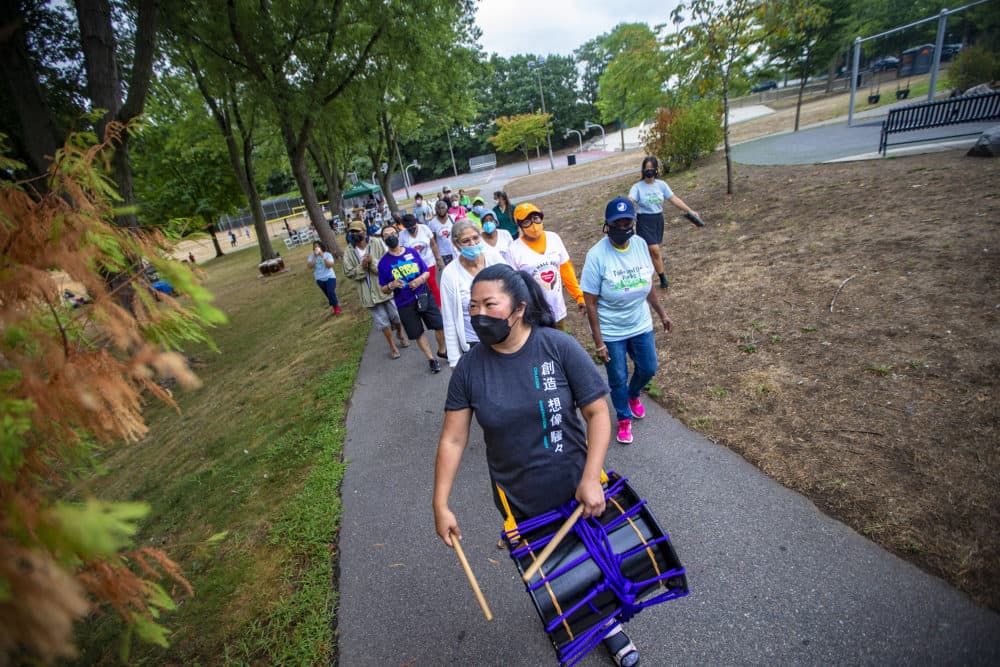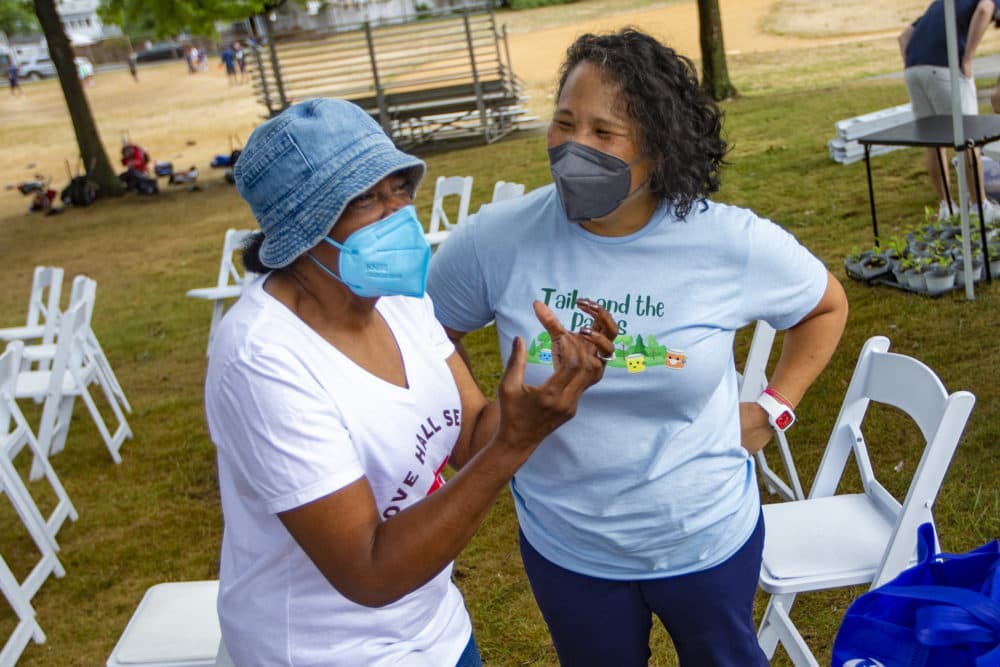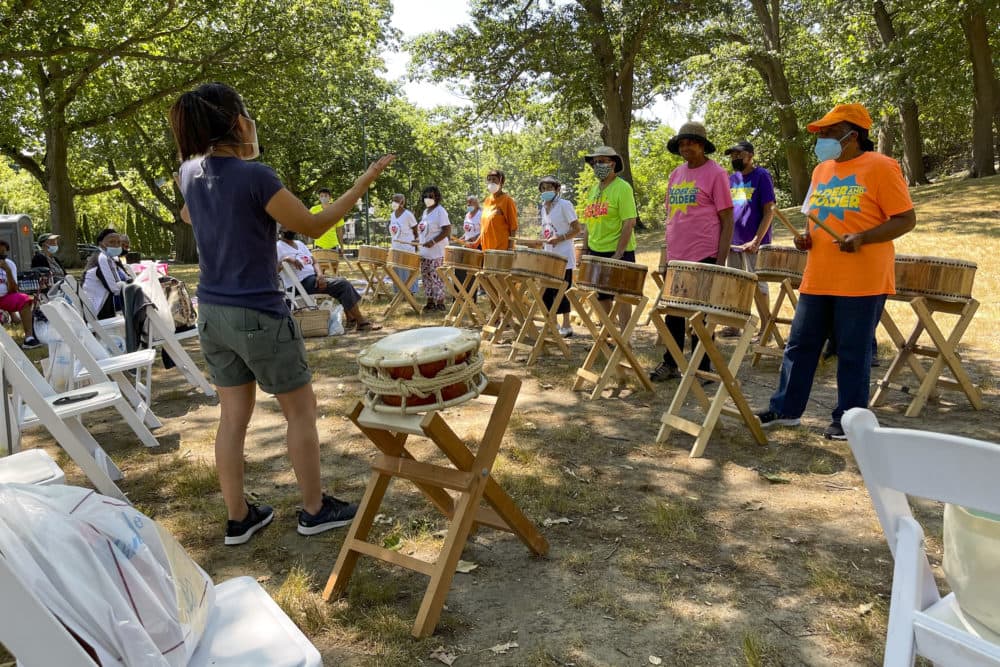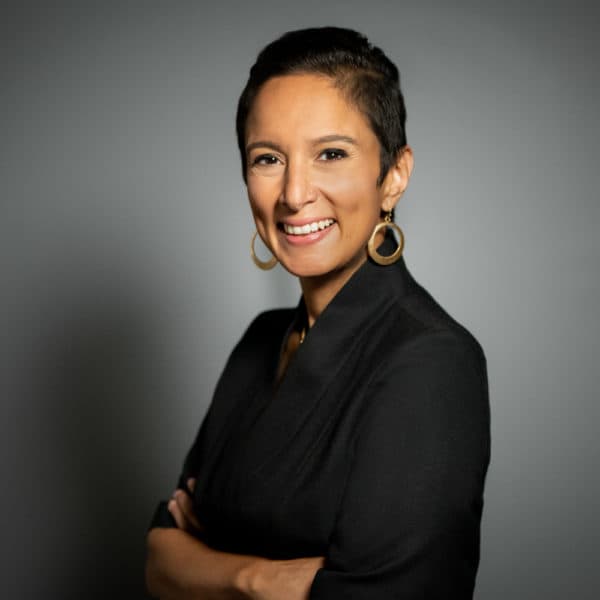Advertisement
For Olmsted's 200th birthday, a renewed effort to make Boston's parks welcoming to all

On a recent hot summer day, a steady beat sounded throughout Dorchester’s Savin Hill park, as several dozen Black seniors gathered to learn how to play Japanese drums called taiko. It looked like a fairly simple set-up — chairs, drums, an instructor, microphones and loudspeakers — but organizers put a lot of effort in to make the event feel inclusive.
The event was funded by a grant from a coalition of civic, nonprofit and community organizations called Olmsted Now in an effort to change the way people perceive who is welcome in parks. The effort is in honor of the 200th birthday of Frederick Olmsted, who designed Boston’s 7-mile-long Emerald Necklace and thought high quality parks should be open and available to all.
“These grants are meant to disrupt spaces, and break them out of the norm,” said Joëlle Fontaine of the Dorchester-based Design Studio for Social Intervention, which is part of the coalition. “Let's shake up what the system has been thus far and see how far we can push it, because some things need to change in order for us to really think about equity in a very real way."
Public parks make communities healthier, but a recent study by the nonprofit Trust for Public Land has found people of color have far less access to park space than their white counterparts.
“Boston is one of the few cities in the country where there actually is a park within a 10-minute walk of everyone who lives there,” said the Trust’s CEO Diane Regas. “But we look not just at, is there a park? But, is it a quality park? And it's in those places where Boston can continue to improve.”

Many note that one of the ways Boston could improve is by making everyone feel included in these green spaces.
At the Savin Hill event, organizer Karen Young said a neighbor made them feel unwelcome by asking what the group was doing in the park, and saying they should move. Another organizer of an upcoming Olmsted Now event, Kera Washington, said she called an insurance company to get the policy the city requires for a permit, and they asked exactly what kind of music would be played. She is planning a day of interactive African diaspora workshops and performances.
“‘Could it be considered rap?’” Washington recalls them asking. “And I said, ‘Well, why are you asking the question?’ And the response was, ‘Well, because our policy doesn’t cover hip-hop.’ So, that was the end of the conversation right there.”
These are the kinds of hurdles novice event organizers — often people of color — face, that Olmsted Now is trying to identify and slowly eliminate. But there was little diversity at the first meeting that led to the formation of Olmsted Now, in 2020. Jen Mergel was there; she’s director of experience and cultural partnerships at the nonprofit Emerald Necklace Conservancy, which funded Olmsted Now’s grants this summer.
Advertisement
“We looked around the room,” she remembers. “There were 39 people. There were three colleagues of color. And everybody in the room was saying, ‘This is not Boston.’ ”
They were thinking and talking about things like George Floyd’s death, and Christian Cooper in New York City's Central Park being accused by Amy Cooper of threatening her because he was asking her to leash her dog.
“And so we were feeling very compelled by this question of if Olmsted was designing these parks, ‘for all,’ for everyone — that really isn't our reality,” Mergel said. “Because clearly structures are still in place that mean these parks don’t feel like they are for everyone.”
The committee decided on a plan for equitable decision-making, involving all the impacted groups in a Committee of Neighborhoods. For help bringing it together, they turned to Fontaine.
“The gatekeepers who have been at the head for such a very long time have a perception of how things should be and who should be at the forefront of all of these things,” she said. “This was the first time I’ve worked on something like this where the people that the grants are really there to benefit, they were at the forefront to make the decisions.”

The committee put out a call for proposals in April, offering $200,000 in grants. They chose 16 winning projects deemed mostly likely to shift people’s thinking about who is welcome and who can be their full selves in Olmsted’s parks. Many of the resulting exhibits, art pieces and events will debut this month.
They range from salsa dancing and a Day of the Dead celebration, to spoken word performances and processions to honor enslaved African Americans. A member of the Nipmuc tribe will burn an 18-foot tree trunk for a week to create a traditional canoe. In Dorchester’s Fields Corner, Asian American groups are planning a multimedia exhibit to tell the stories of people facing deportation.
“It's about, you know, equity — I mean thinking about this sense of belonging,” said lead artist Ngoc-Tran Vu. “It’s about who belongs here, and who's not welcome.”
And it’s about changing those assumptions, she said. That may happen slowly, so the Olmsted Now Committee of Neighborhoods hopes the grant program will continue. The Emerald Necklace Conservancy is raising funds toward that end in the hopes that, one day, Boston’s parks will come closer to being the equitable places for everyone that Frederick Olmsted hoped they would be.
This segment aired on September 1, 2022.
